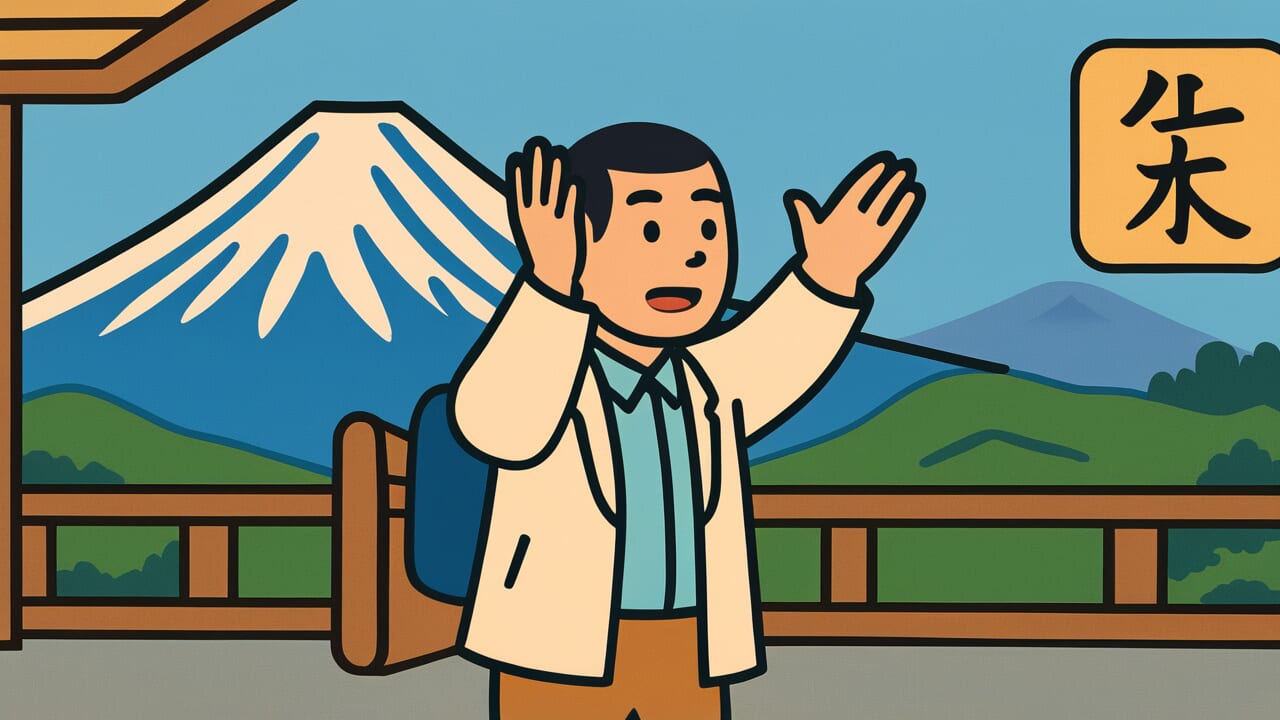How to Read “When you come and see it, Mount Fuji is not so impressive”
Kite mireba, sahodo demo nashi Fuji no yama
Meaning of “When you come and see it, Mount Fuji is not so impressive”
This proverb means that something you looked forward to turns out to be less impressive than expected. Your expectations were so high that the actual experience doesn’t live up to what you imagined.
People use this saying when they visit a restaurant everyone raved about, watch a hyped movie, or travel to a famous destination. The reality just doesn’t match the buildup.
The proverb isn’t just about disappointment. It also shows self-awareness that maybe your expectations were too high. It’s a way to step back and evaluate something more objectively.
Even today, we often feel this way about things trending on social media. We try them out and think, “It wasn’t that great.” This proverb captures that timeless gap between expectation and reality.
Origin and Etymology
The exact origin of this proverb isn’t clearly documented. However, people were likely using it by the Edo period. Mount Fuji has always held a special place in Japanese hearts.
Its beautiful shape seen from afar made it an object of longing for many people.
What’s interesting is that this proverb doesn’t actually criticize Mount Fuji itself. Instead, it uses Japan’s most famous mountain to express something universal about human psychology.
It’s about the gap between expectation and reality.
The majestic sight of Mount Fuji from a distance made people think, “I want to climb it someday” or “I want to see it up close.” But after struggling to reach it, some found the experience less moving than imagined.
Their expectations had been too high to feel satisfied. This kind of experience likely inspired the proverb.
The proverb emerged during a time when common people’s culture was flourishing in the Edo period. As people gained more leisure time for travel, more actually visited Mount Fuji.
These real experiences gave birth to this expression.
Interesting Facts
Mount Fuji stands 3,776 meters tall, making it Japan’s highest mountain. But globally, it’s not particularly high. However, because no other tall mountains surround it, its shape stands out dramatically from far away.
This quality of “looking special from a distance” makes it the perfect metaphor for this proverb.
During the Edo period, religious groups called “Fuji-ko” spread among common people. Many actually experienced climbing Mount Fuji. For people back then, the mountain was both a distant dream and an accessible reality.
Usage Examples
- That famous restaurant? When you come and see it, Mount Fuji is not so impressive.
- Even that popular theme park was like “When you come and see it, Mount Fuji is not so impressive.” I was let down.
Universal Wisdom
This proverb teaches us about the strange nature of human expectations. We build up ideal images of things we haven’t seen yet. We convince ourselves that our imagination is reality.
Then when we actually experience it, we compare reality to the fantasy we created. That’s when disappointment hits.
What’s fascinating is that the object itself isn’t the problem. Mount Fuji remains Mount Fuji, unchanged. What changed is only the viewer’s perspective.
When we remove the rose-colored glasses of expectation, imagination, and longing, we finally face reality as it is.
This proverb has endured because the experience it describes is so universal. In romance, work, and relationships, we constantly face gaps between expectation and reality.
Each time, we realize our expectations distorted what was really there.
Our ancestors used Mount Fuji as a symbol to express this human trait. The proverb warns us about the danger of expectations. At the same time, it teaches the importance of seeing reality as it truly is.
When AI Hears This
Human satisfaction isn’t determined by “actual value” but by “the difference from expectations.” Mount Fuji feels “not so impressive” because imagination builds up too much while viewing it from afar.
Expectations exceed the reality.
Cognitive psychology can express this as an equation. The magnitude of emotion equals “actual experience value minus expected value.” If expectations are 100 but reality is 80, emotion becomes negative 20.
Because information about Mount Fuji being Japan’s highest peak comes first, the brain automatically idealizes it. The longer you gaze from a distance, the more psychological distance amplifies imagination.
A “phantom Mount Fuji” gets constructed in your brain that exceeds the physical fact of 3,776 meters.
Furthermore, adaptation-level theory shows that humans get used to any stimulus. The moment you arrive, your brain quickly resets the baseline to “this is normal.” Excitement rapidly fades.
Modern social media accelerates this phenomenon. Constantly viewing others’ edited “Instagram-worthy photos” inflates expectations abnormally before you even go. If the perfect Mount Fuji image you saw on Instagram becomes your standard, the real mountain will likely be cloudy or hazy.
Disappointment becomes inevitable. This reveals a characteristic of human cognitive systems: happiness is determined by differences, not absolute values.
Lessons for Today
This proverb teaches modern people the importance of controlling expectations. We encounter massive amounts of information daily about trending social media spots and highly-rated services.
That information inflates expectations and might prevent us from enjoying actual experiences.
The point isn’t to have no expectations. Expectations are actually what make life rich and exciting. But we need to understand that expectations and reality are separate things.
When experiencing something, try setting aside thoughts of “how it should be.” Accept what’s in front of you as it is. You might discover joys and insights different from what you expected.
This proverb also teaches that the value of things changes depending on your state of mind. The same Mount Fuji looks completely different when viewed with a heart full of expectations versus a heart that’s open and genuine.
When your mind is calm and receptive, the world shines more richly before you.



Comments